#ReadNotDead
Text
David Tennant's Obscure Performances: His Involvement with Read Not Dead (pt 3) - What You Will
Okay - I promised to fill everyone in on the two unattributed plays David did for the Globe's Read Not Dead project, didn't I? So I'll begin the first never-before-talked-about-in-the-fandom play right now. If you want to catch up on the first two parts and understand a little bit of the history behind the Read Not Dead project before diving into this one, go here for the first part, and here for the second. Then come on back!
The second and third of the four Sunday afternoon staged readings David did while working with the Globe's Read Not Dead (heretofore called RND) project were written by the same author: John Marston. But before we get into the plays themselves, let's take some time to learn a little about John Marston.
Marston was an English playwright whose best known work is 1604's The Malcontent. He began writing in 1598. Much of his work was written for the boy’s theatre company Children of Paul’s and for the Blackfriars. If you went back to one of my previous posts about the Read Not Dead project and David's involvement in their staged reading of 1606's The Fleer by Edward Sharpham, you'll recall reading a bit about the Blackfriars (but if not, they were the Blackfriars Children, a theatre company wholly made up of boy actors.) Anyway, John Marston was a Blackfriars shareholder.
Marston's plays were very popular. He was a consummate satirist who made sure to include lust, violent imagery and impropriety in almost every play he wrote - his poetry was burned by church order! He even dared to satirize the King (though he had to apologize for that of course!) His satirical, critical work caused many a political scandal. Eventually in 1608 Marston was sent to Newgate Prison. After his release, he decided to abandon the theatre, move out of London, and take holy orders. He died in 1634, and to our knowledge never wrote another play. ( As an aside, I encourage you to learn more about Marston. As well as being a contemporary of Shakespeare, he's quite the fascinating character! Here's a good start.)


Okay. Let's go back to the "present" of 2002.
David was a busy boy! He began 2002 starring as Robert in Push Up, an ensemble play about ambition at work. Written by Roland Schimmelpfennig and directed by Ramin Gray, it opened 8 Febuary 2002 at the Jerwood Theatre at the Royal Court.
Push Up was a vignette-style play, and The Telegraph had this to say about it: "The meat of this 90-minute play consists of three edgy, aggressive dialogues between rivals in the firm." David played Robert, who "turns down a proposal from Patrizia for a new TV ad, identical, it turns out, to the one we have already heard described, except that the puddle is now located in New York's Central Park. The fact that these two once had great illicit sex together in Kramer's office, and were both too proud to contact the other afterwards, merely adds to their animosity."
(FYI, I've listened to an audio recording of this play, as it's archived at the British Library. It's stellar!)

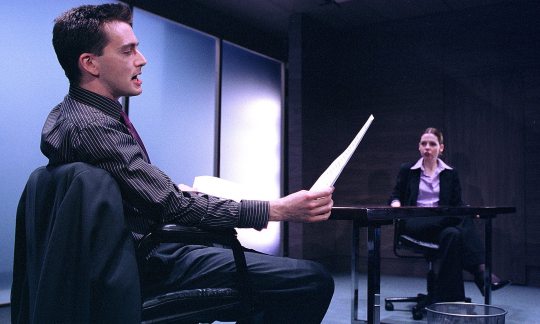

David Tennant as Robert in Push Up, 2002
If you've read my previous threads, you'll recall David's first reading with RND was 1999's Edward III and his last was 2004's The Fleer. But now we're in 2002. And David hadn't done another staged reading with RND since 1999. But that was about to change.
Reviews for Push Up were very favorable. The acting was called outstanding, David's was called "a fine performance", and one reviewer said the "undertow of lust between Tennant and [co-star Jaqueline] Defferary [was] particularly riveting." Push Up's run ended in March 2002.
(Oh...I asked director Ramin Gray if there had ever been a programme for Push Up. He told me a printed edition of the play text with the cast list was available, but as far as he was aware, an official Royal Court programme wasn't made for the run. Published by Nick Hern Books, you can find it on Amazon!)

A month later (April 2002) David was treading the boards again as young security guard Jeff in Lobby Hero by Kenneth Lonergan. Set in the lobby of a middle-income Manhattan high rise, the play presented moral dilemmas about things like culpability, justice, and the dangers of truth. Lobby Hero opened at the Donmar from 10 April 2002 to 4 May 2002, then reopened at the New Ambassadors Theatre from 1 July 2002 to 10 August 2002. During its run, the play (& DT!) got rave reviews. It earned David a Olivier nomination for Best Actor, and the play for Best New Comedy.
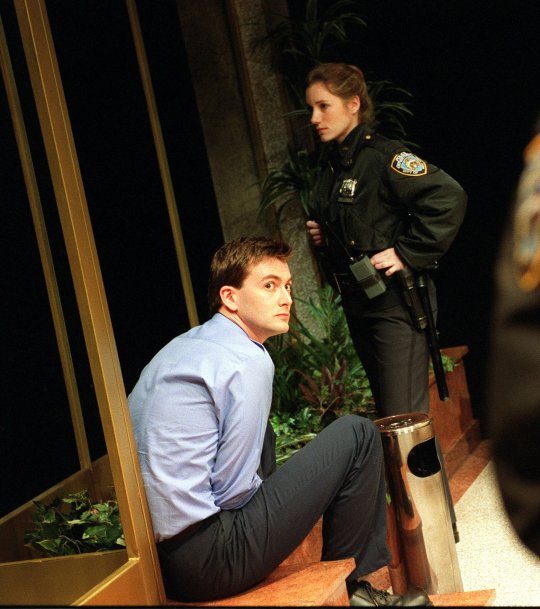
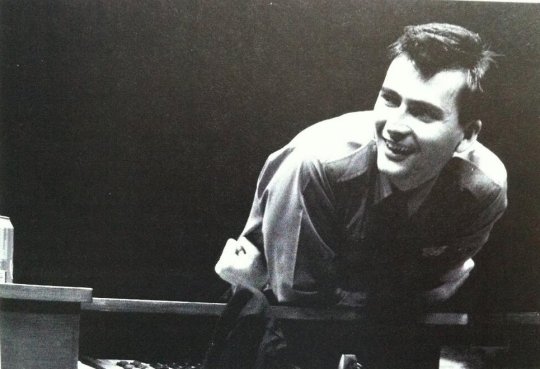

David Tennant as Jeff in Lobby Hero, 2002
David was probably riding a bit high. Push Up had done well and he'd immediately gone to do Lobby Hero, which was generating awards buzz. But did you notice something about the Lobby Hero dates? David had a month off between runs. And he didn't just sit around twiddling his thumbs -- nope nope nope -- because we all know twiddling has never been David's style.
So on 26 May 2002, David showed up once again to participate in RND. This time it was for a comedy called What You Will, which the aforementioned playwright John Marston likely wrote around 1601 but which was not published until around 1607. What You Will was written while Marston was duking it out (in literary-fashion) with a contemporary writer called Ben Jonson. To say the two men didn't like each other was an understatement. They traded satirical jabs and placed caricatures of each other in their plays. And oh....if the play's title feels vaguely familiar to you, you're not wrong there either! Marston pinched the name of the play from a little old thing you might've heard of called Twelfth Night, written by some fellow called Shakespeare.
What You Will was full of song, music and dance, as it had been written for a children's theatre company. It had a large number of younger parts - pages and the like, and women - for the boys to fill (as I'm sure you'll recall, at this time women's roles were played by men and boys.) In addition to the music, it was also a satire as well as a romantic comedy. Set in Venice, it tells the story of Celia, who believes her husband drowned in a shipwreck. She plans to marry, but another of her suitors, Jacomo, schemes with her family to prevent this. David played the role of Jacomo.
And here's the cast list - again, all thanks and credit for the digitized list goes to the Globe Archives!

Here's a more in-depth look at the plot, and here's a link to the full text of the play, if you're interested.
This performance was recorded, though I haven't listened to it (and sadly, the archive notes the last part of the audio is cut off.) You can listen to the recording of the performance and others from the series, as the recordings are archived in the Globe Archive and Library in London. Access to the archive is available by appointment only for professionals and academics affiliated with institutions of higher education.
So on that Sunday in 2002, David joined in to perform the satirical musical romantic comedy What You Will, directed by James Wallace. And speaking of musical parts - there was singing and dancing to do, scripts in hand. And Jacomo had at least one song to sing!
I'm sure many of you have wondered whether David's done any honest to goodness musicals during his career. Well, I'm here to tell you that while he's burst into song relatively recently and briefly with Don Juan In Soho and Good, and quite possibly with What You Will as well (I haven't listened to the recording of the play to see if David actually sang) - I can provide a partial answer to that question. In a previous interview he mentioned an early play he did in drama school called The Hired Man and said he was a member of the chorus. Yes, that's true, he was, and yes, he did sing in that 1989 production (listen here to hear him sing part of what he sang then.) So he's certainly flirted with the genre. But as I've done much research into those early days of his, there miiiiiight be a few other productions in which he sang. *ahem* I'm just sayin'.
All that comes later. For now, here ends the tale of What You Will. But don't despair - I mentioned earlier we've got one more staged RND reading of David's to explore, and I hope you'll tune in to hear about it, too!
#DavidTennant#ObscureDavidTennantPerformances#ReadNotDead#DavidTennantEarlyTheatre#WhatYouWill#LobbyHero#PushUp
24 notes
·
View notes
Photo
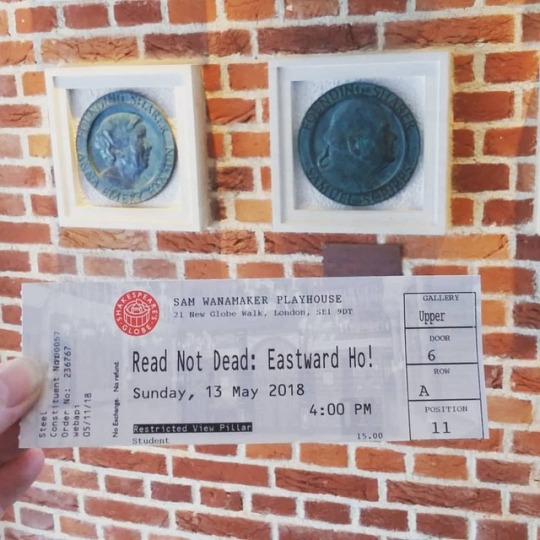
Jacobean theatre perfect for a Sunday afternoon #samwanamakerplayhouse #shakespearesglobe #ReadNotDead #theatre #EastwardHo (at Sam Wanamaker Playhouse)
0 notes
Text
David Tennant's Obscure Performances: His Involvement with Read Not Dead (pt 2) - The Fleer
This second part of my series on David Tennant and his involvement with the Shakespeare's Globe Read Not Dead project is about to begin. If you'd prefer to read my first post about David and his portrayal of Edward the Black Prince in the one-off staged reading of Edward III (as well as some history about the Read Not Dead project itself) before beginning this one, it's here: go read it, and then come on back!
Okay, if you're back, let's jump forward in time - pun intended! - to 2004 and talk a little about David's last performance with Read Not Dead (heretofore referred to as RND). By June of 2004, RND had performed more than 100 of the lost plays of the 16th and 17th centuries. Next up for them? Edward Sharpham’s 1606 farce, The Fleer.
The Fleer is the other of the two staged readings many of David's longtime fans might know he did with RND. It was listed on the now-defunct (but brilliant and well-researched) David Tennant theatre fan site, 'The Play's The Thing'. I miss that site daily - I used and appreciated it countless times over the years.
Sharpham wrote The Fleer specifically for the Blackfriars Children, a theatre company wholly made up of boy actors. Blackfriars was so popular, Queen Anne of Denmark patronized them for a time! Oh, and every now and again they got arrested when they insulted King James I.
According to a LibraryThing review, The Fleire was "written in response to Measure for Measure, and with not one but two heroines disguising themselves as boys, [it was] a tale of sex and politics in Jacobean London seen through the eyes of a malcontented Italian duke." This usurped duke, named Antifront, escapes Florence to seek sanctuary in London. He assumes the disguise of The Fleer, which was a term used to represent a foolish and simpering facial expression.
If you're interested, there's a full text of the play right here which was the one used for the staged read-through!
But back to the present. Well, 2004.
As part of RND, The Fleer was performed on Sunday, 20 June 2004 at the Bear Gardens (roughly a mock up of an indoor hall playhouse of Shakespeare's time) and was directed by actor Tony Bell. David played the role of Lord Piso, the son of the Florentine Duke Piso, Antifront’s usurping rival.
Reviews of the performance were good. WhatsOnStage had this to say: "While Edward Sharpham’s 1606 farce The Fleer may not warrant a full production, it received a zesty run-through at last Sunday’s reading, directed by actor Tony Bell. And the quality cast alone – which included David Tennant, Alan Cox, Barnaby Kay, Geoffrey Freshwater and Claire Price, all donating their time – was certainly worth the cost of the £10 ticket."
And that is the story of The Fleer. I would be remiss if I didn't include the cast list from the play's programme, though. With (again) thanks to the Globe's digitized archives, I give you:

One other thing......and here's where it gets interesting.
Even the brilliant "The Play's The Thing" site had Edward III and The Fleer listed as the only two staged readings David ever did with the Read Not Dead project. But he did two others! I'll explore those, too. I promise.
But in what will become common in my slowly developing upcoming podcast, as we delve deeper into David's early career we'll see this happen over and over and over....and bloody over! If you think he did two plays, he did four. If you think he didn't do any, he did.
I've found a whole lot of new stuff. But there's always more. It's David, after all!
15 notes
·
View notes
Text
David Tennant's Obscure Performances: His Involvement with Read Not Dead (pt 1) - Edward III
A lot of you are aware that for the better part of a decade I've done research on David's early Scottish theatre work (80s/90s). I've found a ton of info and am in slooooow development on a podcast aimed at sharing my discoveries. But not ALL my research lands squarely in those years. I've learned about plenty of DT's theatre projects which fall outside of the years my podcast covers. So it occurred to me - since I'm not planning to do a podcast about those years, why not share some interesting tidbits?
Let's dive in!
By January of 1999, David was living in London and beginning a two month run at the Almeida's Albery Theatre as Pavel in Vassa (a comic portrait of a powerful iron-willed matriarch who sees her family destroyed by the very values that she seeks to preserve.) So he was busy, yes? Not busy enough, apparently, because he agreed to join thirteen other actors to do a one-off staged reading of a play often attributed to Shakespeare as a co-writer - called Edward III.
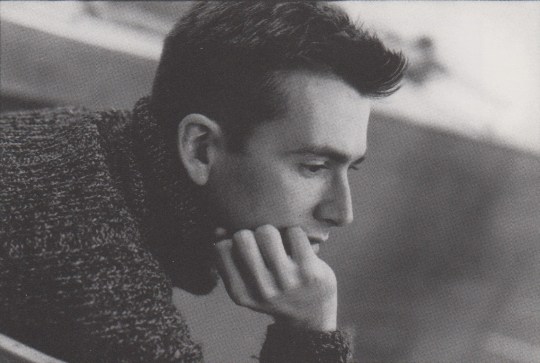
David in rehearsal as Pavel in Vassa: Scenes From Family Life, 1999
Edward III was part of a series of performances the Education Department of Shakespeare's Globe Theatre had been doing since the early 1990s called Read Not Dead (heretofore referred to as RND). Their website has this to say about their mission: "Read Not Dead is a multi-decade project run by Shakespeare’s Globe, one in which we plan to perform every single ‘unknown’ play that has survived in print, from the accession of Queen Elizabeth I in 1558, to the closing of the theatres in 1642. Some plays from history deserve to be read, not dead."
(By the by, RND is still active today! I encourage you to read more about their mission and the plays they've performed by going to the Read Not Dead website.)
Performing in an RND play was a unique challenge for an actor. RND performances were staged readings, so actors didn't do the traditional rehearsals. Instead, they received scripts only a few days ahead of the performance. The project's website explains it like so: "The rules of the project have always been simple, experimental, and completely unique. Whilst approaching one individual play, the group does so within one single day. In the morning, the company meets for the first time and throughout the day they work with a Director and experiment with props and costume. Often music is also composed within the short time-frame, too. By the afternoon, the play is put up on its feet and presented as a script-in-hand performance to a live audience." Additionally, most RND plays were performed on Sundays (traditionally the only day off for most performing actors in the theatre circuit, this made the full day's preparation possible.)
These challenges almost certainly appealed to David for a number of reasons: 1) it was a one-off performance with a tight schedule, 2) we all know how he feels about Shakespeare, and 3) the Globe! When an opportunity came for him to play a role in or around that great structure, certainly one imagines he sprung at the chance!
So on 21 February 1999, David played the role of Edward, Prince of Wales (aka the Black Prince) at the Globe Theatre Education Centre/Inigo Jones Theatre. The performance was on a Sunday - that day, the group met at 10a for a run-through, and at 3p they went onstage. It was directed by Clive Brill (who - fun fact - has since worked with David on many things, including the radio dramas The Order of Release, The Island, Murder in Samarkand, The Purple Land, and the two part Afternoon Play series Stevenson in Love).
Now for a treat. Want to see a page from the programme? Ask, and ye shall receive! (Thanks and credit to the Shakespeare's Globe Archive for the digitized programme, which you can see in further detail here.)
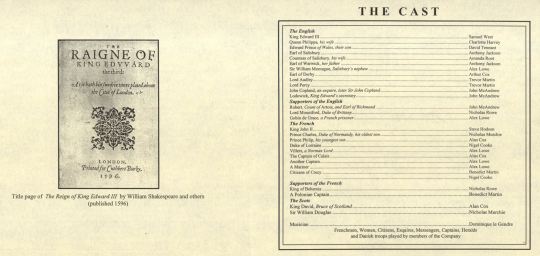
This performance was recorded, and I've actually listened to it! (sadly, the audio is only of the first two acts - for some reason, Acts 3 and 4 are missing.) I found it quite well done, especially considering the short amount of time the company of actors had to rehearse. You can listen to the recording of the performance and others from the series, as the recordings are archived in the Globe Archive and Library in London. Access to the archive is available by appointment only for professionals and academics affiliated with institutions of higher education.
Now.....some astute DT fans might be aware that while Edward III was the first time DT worked with the RND project, it wouldn't be his last. Very true! He was to go on and work with the project three more times. We'll explore those in more detail in future posts.
19 notes
·
View notes
Text
David Tennant's Obscure Performances: His Involvement with Read Not Dead (pt 4) - The Insatiate Countess
And here, my friends, is the fulfillment of my promise - the last of the four threads about David Tennant and his involvement with the Read Not Dead (heretofore called RND) project at Shakespeare's Globe. This will concern the second of the two unattributed plays David did for RND and is the last of the two never-before-talked-about-in-the-fandom plays he did with them. If you feel like you need to catch up on the first three parts and understand a little bit of the history behind the Read Not Dead project before continuing with this one, go here for the first part about Edward III, here for the second part about The Fleer, and here for the third part about What You Will. Then come on back!
With all those links out of the way, we can continue with the last of the four plays - and the second one which I believe new to the David Tennant fandom.
When we last left our intrepid Scots thespian David T., he'd just wrapped up a staged reading of John Marston's What You Will for the RND. He had managed to fit the reading in between the April-May 2002 and the July-August 2002 runs of his then-current hit play, Lobby Hero.
Between then and November of 2002 (the next time he stepped on the Bear Gardens stage to do another RND staged reading) David had been seen on a number of other projects. In 2002 alone he'd been featured on an episode of Foyle's War and in the short film Nine And 1/2 Minutes by Josh Appignanesi. Lobby Hero had got him noticed; his star was on the rise. He was getting busier (and he'd get busier still when his next two plays, 2003's The Pillowman and 2005's Look Back In Anger, as well as his seminal role as Peter Carlisle in 2004's Blackpool, would catapult him into the public consciousness.) And - of course! - Doctor Who was also barreling down the pipe. But all that was still in his future.

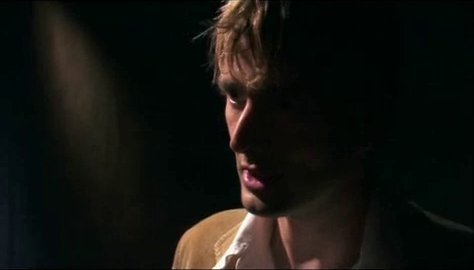
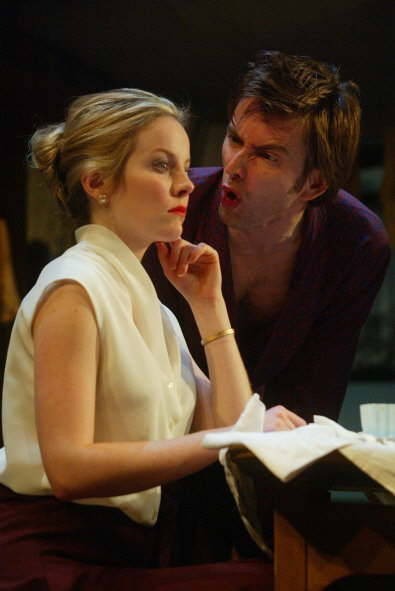

David Tennant in (clockwise from top left): Foyle's War, Nine And 1/2 Minutes, The Pillowman, and Look Back in Anger
No, for right now it is Sunday, 10 November 2002, and we're along for the ride as David arrives at the Globe for the morning's balls to the wall rehearsal of the Tony Bell-directed John Marston play, The Insatiate Countess, before getting on stage at the Bear Gardens Theatre. We don't know whether David signed up for this one (or any of them, for that matter)! If so, he received his script a few days before, but if he was drafted at the last minute he would've received his script only hours before taking the stage that afternoon! Either way, he was surely up for it.
In the previous thread on What You Will I spoke about playwright John Marston. But this play - The Insatiate Countess - is a mystery wrapped in an enigma. Marston started writing the tragicomedy in 1608 and had the first act and part of the second written before - oops! - he was thrown in jail. Following Marston's imprisonment, the play languished for a while, and when Marston was released and took holy orders he wanted NO part of finishing it. Two other writers took it upon themselves to finish the draft: actor William Barksted, and Lewis Machin. This multi-authored approach caused significant issues - the other authors juggled the names of the characters, for one - and suffice to say, it really isn't a "finished" play in the way we'd envision the meaning of the term. It finally got published in 1613.
Scholars have had a lot to say about the play's provenance, and there are many different editions of it. It's also widely studied because it's been acknowledged as highly unusual for its time - since it shows female characters driven explicitly by sexual desire.
According to UK Theatre Web, The Insatiate Countess is "a play dripping with innuendo from its very first lines [as] sexual obsession leads to murder as Isabella, widowed Countess of Swevia, wastes little time in remarrying before running off with another man. And then another. And yet another." And, as is usual for plays of this period, there is also a second comic plot going on. "Meanwhile, two new brides coolly frustrate their husbands' wife-swapping attempts at revenge."
So...if the uniqueness of The Insatiate Countess has intrigued you and you'd like to read (one version of) a full text of the play, you can find it here:
That link will take you to the version of the play used during the RND performance reading.
But back to that staged reading. When RND staged it in November 2002, they stated "it was the first performance of the complete play - tragic and comic plots together - since the 17th Century." David played the role of Rogero, Count of Arsena and Massino, later Isabella’s lover. The actors all donated their time to the project for free.
And here (again thanks to the Globe Archives) is the cast list from the digitized programme for the 10 November 2002 performance:
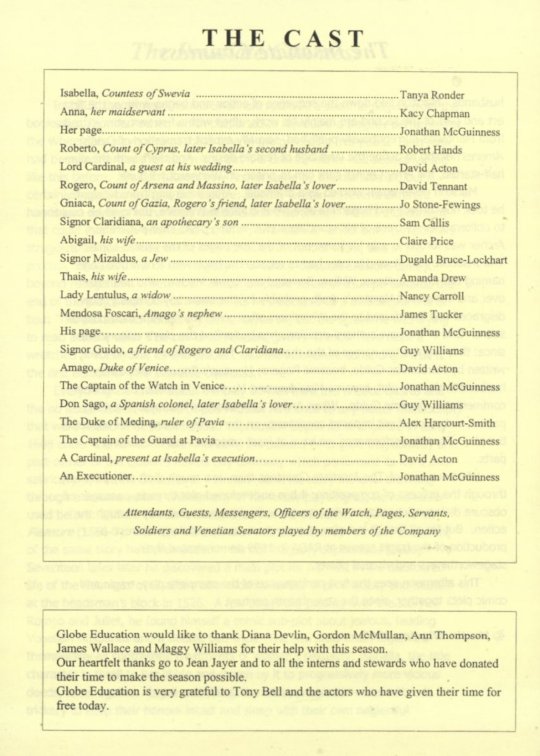
In February 2020, the Shakespeare Institute Players (their student theatre company out of Stratford) performed The Insatiate Countess, by William Barkstead and Lewis Machin, from a draft by John Marston." There appears to be no full version available online, but here is a short snippet of it if you'd like to take a listen:
And with that, my patient listeners, we wrap up the history of David's four interactions with the Shakespeare's Globe Read Not Dead project, which brings dead plays to life. While David did only four plays, the Read Not Dead project continues to this day.
One last postscript: the performance of The Insatiate Countess was recorded - as were all four of David's staged readings with RND - though I haven't listened to it (and sadly, the archive notes the start of the audio is cut off.) You can listen to the recording of the performance and others from the series, as the recordings are archived in the Globe Archive and Library in London. Access to the archive is available by appointment only for professionals and academics affiliated with institutions of higher education.
I've listened to Edward III and The Fleer, but have yet to hear What You Will or The Insatiate Countess. On my next trip to London, I'll be sure to make time to listen to both - even though some of the audio is missing on both of those, that's all right. I'll listen to them anyway!
I hope you all have enjoyed traipsing with me down the memory lane of David Tennant's works at the RND. 'Til next time!
#DavidTennant#ObscureDavidTennantPerformances#ReadNotDead#DavidTennantEarlyTheatre#TheInsatiateCountess
13 notes
·
View notes
Photo
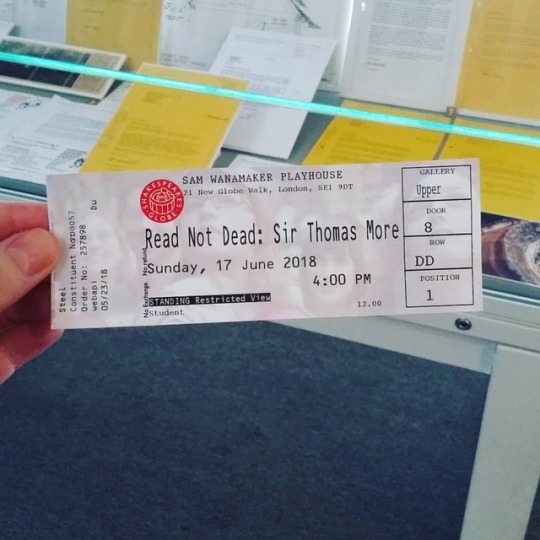
I am REALLY excited about seeing this one. #samwanamakerplayhouse #ReadNotDead #SirThomasMore #Shakespeare (at Sam Wanamaker Playhouse)
0 notes